Procrastinators’ Gift Guide
Music
year end radio wrap up
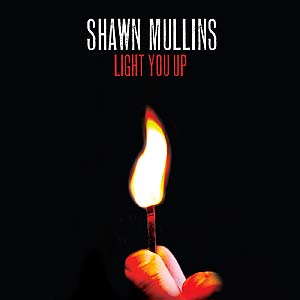 |
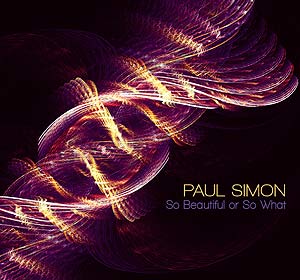 |
 |
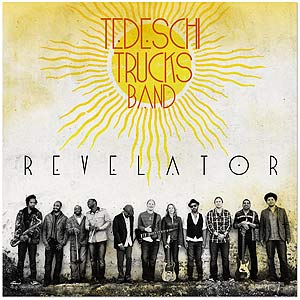 |
 |
Radio traffics more in the world of single songs than albums. So which songs affected KLCC listeners the most, judging by the ringing of the studio phone? What did listeners tell me they most needed to have, as soon as they heard it?
Surprisingly, the phone-ringing song of the year was “Light You Up,” the title track on Shawn Mullins’ latest album. A great and creative song, yet I was amazed by its persistent resonance. Too bad nothing else on the album connected as well.
Lately, the instant phone-ringing song has been the incendiary political firebomb called “One Percent/Ten Ton Shoes” by Chris Chandler and Paul Benoit, from their album Matadors. It’s a scathing merger of spoken word and rocky edges, an uncompromised shredding of political and economic hypocrisy — the perfect Occupy soundtrack, and the most unforgettable protest song of the year. I suspect they’ll bring it live to the main stage at the Oregon Country Fair when they perform there this summer.
I shared listeners’ affinity for the aforementioned songs and albums, but the CD that most repeatedly found itself in my player at home was by Frankie Hernandez, who happens to play with Chandler and Benoit. Back in Oregon after a stint in Austin, Texas, Frankie appeared at Country Fair time with his homebrewed album If You Seek, and it became my soundtrack for months. Everything from soul to reggae, hip hop to tango blends into one cohesive mix, all with a conscious spirit as positive as Michael Franti’s.
I also found myself completely immersed in So Beautiful or So What by Paul Simon. The man is 70 years old and making some of the finest music of his life. His lyricism maintains exceptional grace, his voice is as strong as ever, and it’s time he received more recognition for his guitar playing, which is stellar without ever needing a single solo. Love, spirit and raw pain merge seamlessly, somehow turning overwhelming sadness into beauty.
Inspiration also reached me in a bluesy way through the Tedeschi Trucks Band and their masterwork Revelator. Susan Tedeschi has long had one of the best edgy blues voices around, and Derek Trucks is one of the finest blues guitarists. After they blended in marriage and music, another transcendent level of expression emerged. The album features terrific songwriting contributions from Gary Louris of the Jayhawks and others, and the results reveal endless depth. This is catharsis at its finest. It’s also affirmation that merging marriage and creativity can enhance both.
The young voice of Sarah Jarosz is perfectly pure on Follow You Down. She may be barely old enough to buy a beer, but her musical maturity is in full flower. With half of Alison Krauss’s band behind her, as well as Corvallis violinist Alex Hargreaves, among others, her second album stands alongside anything her mentors have created, and is destined to be a classic of Americana.
There are countless other albums deserving mention, and we’ll celebrate more of them on the year-end edition of KLCC’s Living Large on Friday, Dec. 30. This is a time of brilliant music; it’s merely a difficult time for the deserving to be heard amidst the din. The most important thing we can do is listen.
Eric Alan is host of Living Large, KLCC’s new daytime program of music, arts and culture, running Monday-Friday, 12:15 p.m. – 3 p.m. KLCC is found at 89.7 FM in the Willamette Valley, and online at KLCC.org.
New Year’s Top 5
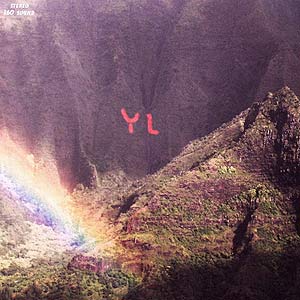
Year of Hibernation Youth Lagoon
Youth Lagoon’s gem of a debut, Year of Hibernation, is an atmospheric textural collection of sweetly sad songs from Boise, Idaho’s Trevor Powers. The album consists mainly of voice, keyboards, drum machine and guitar, with Powers sing/shouting in a diminutive and strangled yelp over something less than “lo-fi” production — more like a dispatch from some alien teenager’s bedroom. Underneath it all are strong, tuneful and compelling indie-pop songs with heart, proving Powers isn’t afraid to hook you with sweet melodies and infectious rhythms. The track “Afternoons” will have you enraptured on first listen.
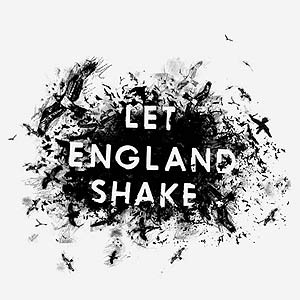
Let England Shake PJ Harvey
A high point in PJ Harvey’s amazingly consistent career is this year’s Let England Shake. This is the sound of Harvey processing the decade of war her native U.K. has shared with America, and the result is a rich, rewarding album that reveals Harvey finding balance among all her personalities — the banshee, the folksinger, the chanteuse and the punk rocker. Rarely have we heard Harvey so focused and so nuanced. Tracks of note are “The Last Living Rose” and “Words that Maketh Murder.” With Let England Shake, Harvey redefines the protest album for modern warfare and writes a love letter to merry old England — in all its musty and faded glory.

Go with Me Seapony
Seapony’s Go With Me is a dreamy fuzzed-out nugget — a sugary pop confection. The Seattle-based trio writes simple and tuneful guitar-based songs that rarely clock at more than three minutes or feature more than three chords. Jen Weidt’s breathy vocals float over Danny Rowland’s jingly-jangly guitar hooks, all propelled along not by a real drummer but the steady bip-bop of a drum machine. There are girl-group sounds in the mix and the melodrama of The Smiths shows up now and then, while the cooler-than-you attitude of the Velvet Underground mingles with the arty power pop of Beat Happening and Young Marble Giants. What is not present is any grand statement about society or modern life. But when music is this clean and refreshingly simple, a catchy tune is all you need.
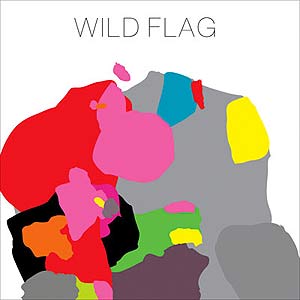
Self-Titled Wild Flag
Wild Flag is a super group featuring Carrie Brownstein of Sleater-Kinney as well as members of the Jicks, Helium and the Minders. The result is less a super group of aging riot grrrls riding past glory and more a killer haymaker of power-pop and punk rock. Given the track record of most super groups, this album shouldn’t be as good as it is. Think the Go-Gos meets Patti Smith meets Bikini Kill. The album works because Wild Flag works as a unit — a band first and a super-group second. There are plenty of stereotypes about all-female rock bands, and Wild Flag transcends every one with tracks like “Romance” and “Future Crimes.” Wild Flag’s self-titled debut is one of the best rock records of 2011.
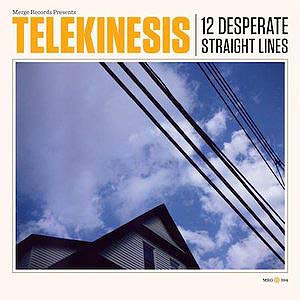
Desperate Lines Telekinesis 12
“Fell in love in the summer by the springtime we were done” sings Michael Benjamin Lerner on Telekinesis’ 2011 release 12 Desperate Straight Lines. This pretty much lets you know what’s in store in this breezy, summery collection of pop songs referencing everyone from the Kinks to Nirvana to the Cure. Featuring Death Cab for Cutie’s Chris Walla, 12 Desperate Lines captures that rare quality of great ‘80s music when you’re not sure if you want to dance — you know, like Ally Sheedy in Breakfast Club — or lock yourself up in your bedroom and cry. “Please Ask For Help” is worthy of Robert Smith’s best tunes, followed up with “50 Ways” — which brings back `90s radio in all it’s fuzzy power-chord glory. But Telekinesis is far from pastiche. This is just great pop music for the post-Woodstock crowd — those who remember when MTV still played videos.
William Kennedy is a freelance local arts and culture critic who can be read in EW and Eugene Magazine. He spent many years working in local record stores. He lives with his wife Kim and daughter Olive, who both politely accommodate his obsession with Doctor Who.
Staff Picks
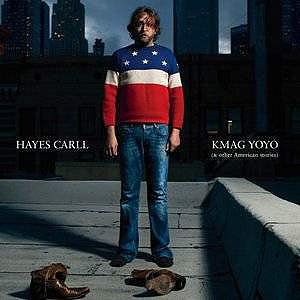
KMAG YOYO Hayes Carll
For a songwriter, a tune like “My Girlfriend Left Me for Jesus” is a tough one to follow. But KMAG YOYO — a military acronym for “Kiss my ass guys, you’re on your own” — celebrates Hayes Carll’s ability to pay homage to traditional country while bringing his own contemporary swagger up a notch. Carll manages to be a gritty, hard-drinking Texas songwriter without being a cliché. I’m not sure how he does it, but it’s his songs that beg to be listened to, a shot of bourbon in one hand while holding yourself back from clapping, that I like best. They make for good late-night deadline writing tunes. Not that anyone at EW ever writes with whiskey close at hand. Add into that the anti-war political commentary of the title track and add in the quirky duet “Someone Like Me,” and KMAG YOYO is a good road-trip album too. The more wistful “The Letter” and the gospel influenced “Hide Me” are lovely too. End of year bonus: Need one more reason to buy KMAG YOYO? It’s got a song about Christmas on it. — Camilla Mortensen
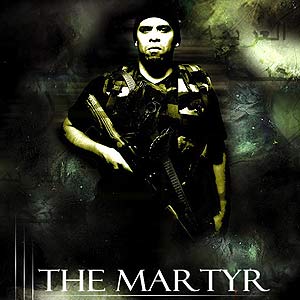
The Martyr Immortal Technique
Immortal Technique’s senior album is everything you’d expect from the world’s at-large artist-activist. The Martyr is brazen, confrontational and unconcerned about those it may offend. Fans expecting an encore from The 3rd World will be satiated. Hip-hop heads looking to see Technique flex his battle-rap prowess, as he did on Revolutionary Volume 1 and Revolutionary Volume 2, will not get their cookie — but hey, that’s not what Tech is trying to do anymore. The Martyr is a political statement, soaked in the contemporary slipstream of Occupy movements, corporate bailouts and impenitent reality.
If you’re pressed for time and don’t know what to buy your teenager whose taste in “hip hop” music seems to be the gourmet equivalent of roadkill, The Martyr is the album you want to stuff stockings with. Immortal Technique is that didactic breed of artist who takes listeners by force, instills passion and refuses to be ignored.
Even better, you can order hard copies of The Martyr for free, paying only the cost of shipping and handling. — Dante Zuñiga-West
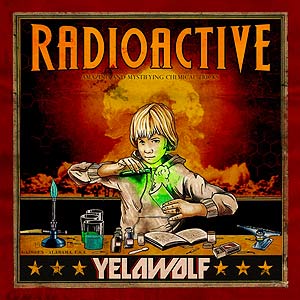
Radioactive Yelawolf
Alabama-born rapper Yelawolf’s much anticipated Shady Records debut, Radioactive, has received everything from critical raves to howling put-downs, but worst of all are the disappointed sighs issued by fans expecting a copycat sequel to his massively successful underground mix tape, Trunk Music. Sure, Radioactive doesn’t contain anything as creepy-crawly compelling as “Pop the Trunk” (what album does?), but listeners willing to huff a lungful and give Yela’s latest a few go-‘rounds might be surprised. There are layers and layers below the menacing surface here — endless reverberations and haunting echoes from the sawed-off syllabic spray of his trademark delivery.
Radioactive’s opening quartet of tracks, which includes “Let’s Roll” and “Hard White (Up in the Club),” does it’s due diligence: It introduces Yela (introducing Yela) to the world, lays down the law and then makes way as the man tears it up — crazy fast, artfully chopped syllables, fierce white-trash anthems, wicked wordplay, that cold ear for hook, melody and fist-pumping chorus. Deeper into the album there are some unexpected, whathefuck but admirably gutsy choices: On “The Hardest Love Song in the World,” he mic checks with “I usually don’t do this, but fuck it,” after which he delves into the get-laid Motown funk of EW&F; it’s a bold move (some say crass), and gambits like these succeed often enough. Yela makes no apologies, in person or in the press, about his desire to gain as broad an audience as possible, and more power to him; as Bob Dylan noted, once you get your foot in the door, they can’t kick you out. Yela’s foot is solidly in the door. If the sonic ambush of Trunk Music revealed a furious new talent hungering to be reckoned with, Yelawolf’s big-label debut is a broad (a bit too broad sometimes) but assured step into the long-haul lane of artistic maturity, in all its risks, rewards and complexity. — Rick Levin
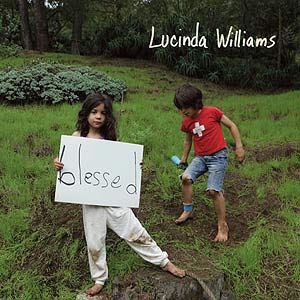
Blessed Lucinda Williams
Forget about the gold records, the multiple Grammy Awards and being named “America’s best songwriter” by Time. Forget about Santa Cruz naming Sept. 6 “Lucinda Williams Day” and Vic Chesnutt writing a song entitled “Lucinda Williams.” Forget about her collaborations with Elvis Costello, Ryan Adams, Emmylou Harris and Steve Earle. Forget about all that, because all you need to know about singer/songwriter Lucinda Williams is this: One of her songs made a past poet laureate weep like a little baby.
Yeah, sure, the famous poet just happened to be her father, Miller Williams, a fact that takes absolutely nothing away from the song, “Car Wheels on a Gravel Road,” an intimate, crushing evocation of childhood alienation found on Williams’ 1998 masterwork of the same name. Williams sings hurt and loneliness like Van Gogh paints haystacks and whores: with a passion inseparable from style, delivered in thick, idiomatic details that overwhelm reality and grant language to the spirit. With her scorched, gravelly vocals and inimitable ear for melody, Williams — with nary a hit to her name — has painstakingly crafted a body of work that stands beside not only that of our greatest of country/western artists but of any American songwriter of any generation.
Since the breakthrough release of Car Wheels on a Gravel Road, Williams’ career has been, according to critical opinion, uneven — if by uneven you mean not quite perfect. World Without Tears (2003) and West (2007) are great albums. But there is an unmistakable aura and buzz about her latest release, Blessed, that harks back to the fire she captured more than a decade back — something essential, like tapping the cosmic mainline. Nobody writes better songs about self-destruction than Lucinda, and with “Copenhagen” — one of her greatest heartbreakers yet — Williams turns a friend’s suicide into an agonizingly pure monument to the senselessness of any loss. Blessed, as with the best of her work, is a bittersweet blend of hopelessness and hope, love and longing, and it finds Williams, at 57, hitting yet another artistic peak with what might be her finest collection to date. — Rick Levin
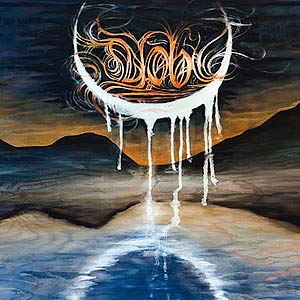
Atma YOB
While the whole shopping local thing is in style, there’s no better opportunity to buy the vinyl of that one critically acclaimed underground-turned-international Eugene doom metal band, YOB. YOB swirls chasms of psychedelic aura into its slow, repetitive riffs and song structures — songs that span themes as broad and universal as Buddhist mysticism, and rhetoric as varied as stream of consciousness and mantra. As recordings go, vinyl only enhances the organic quality of the album. It’s like hearing fern fractals grow, or watching a cougar gracefully maul a deer while meditating in the forest.
YOB frontman Mike Scheidt’s vocals are the most varied they’ve ever been and these songs push him to explore more challenging spaces. From higher octaves reminiscent of Rush’s Geddy Lee or Black Sabbath’s Ozzy Osbourne to low death growls that reverberate your “heartcenter,” Atma is an easy snag from House of Records. YOB will have you and your loved ones wondering what took you so long to get into local metal. — Andrew Hitz
Stocking Stuffers

WISPR Vaporizer
The vaporizer is a techno-industrial gizmo that sidesteps the downside of recreational consumption of “legal smoking herb.” When said herb is combusted, temperatures of well over 1,000 degrees Fahrenheit deconstruct the organic material into a plethora of different carcinogens, tars and other potentially toxic compounds. Depending on the plant, there may be cancer-forming compounds present.
Regardless of what variety of “legal smoking herb” you or your loved ones choose to consume, be smart about it and vaporize. And if you can muster the hefty price tag, this here WISPR vaporizer from Midtown would make one hell of a stocking stuffer. — Andrew Hitz
Marvelous Maps
Eugene-area cartographer David Imus has been busy for years perfecting maps that draw praise from his colleagues as “our discipline at its best.” These artful and information-rich maps of the U.S. and Oregon make great gifts for students and lovers of geography. Find the folded versions in local stores such as Tsunami, Willamette Stationers, J. Michaels, UO Duck Store and Smith Family Books (on campus), starting at $12.95; or larger version as posters ($29.95); or even laminated posters ($39.95) can be found at www.imusgeographics.com with free shipping and quick delivery.
His new Essential Geography of the United States of America was named Best of Show at the “Academy Awards” of cartography in early 2011. Fellow cartographer Stuart Allan says, “Only professional cartographers will appreciate the enormous effort that went into this map; everyone else will like it for its combination of comprehensiveness and apparent simplicity.” A video about the maps can be found at http://wkly.ws/15b — Ted Taylor
 |
Mikkeller “Fra Til”
Mikkel Borg Bjergsø is Mikkeller, a so-called “phantom brewery” from Denmark that uses other brewers’ facilities to concoct adventurous and many times over-the-top brews. Bjergsø’s goal was to create beers that “challenge the Danes’ taste buds with intense taste adventures, and some of the inspiration is found on the other side of the Atlantic Ocean where the American breweries aren’t afraid to play and break all the rules.”
And Bjergsø has done just that in his collaborations with American micros like Stone and Three Floyds. If you haven’t yet picked up a little gift for the beer snob in your life, Mikkeller’s got you covered.
The “Fra Til” (Danish for From To) is a beer already appropriately labeled and ready to unleash its own holiday cheer. The beer’s a Baltic porter, a style pretty indistinguishable from a stout, and has an interesting mix of spices whose flavors range from pine sap to cinnamon topped by an upfront booziness. Of all the potential flop gifts you might give, rest assured that anyone rejecting this beer gift from 16 Tons (or any gift of beer for that matter) is probably daffy. — Andrew Hitz

Save the Fairies!
As J.M. Barrie would have us remember, every time a child says, “I don’t believe in fairies,” a little fairy drops dead somewhere.
Save the fairies, and give the last-minute gift of imagination to your kid, your kid’s kid, or the young at heart. Local artist Wendy Weller has maxed out her production of “Faerie Villages,” but if you hustle down to Antrican you can pick up the few that are left. Constructed from locally grown gourds and found objects, Weller’s Faerie Villages are the perfect and affordable gift for those who dare to believe. — Dante Zuñiga-West
Books
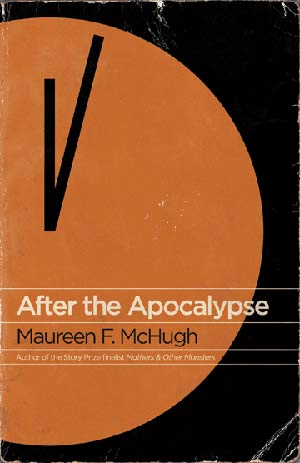
After the Apocalypse by Maureen F. McHugh
Author Maureen F. McHugh conjures up ten ways that everything can go wrong in her sci-fi short story collection, After the Apocalypse. Unlike sci-fi stories that read like alternate versions of reality, After the Apocalypse is a truly futuristic collection that envisions a new future of zombies, bird flu, dirty bombs or a plague of a Mad Cow-like disease. According to McHugh’s scenarios, everything will go to shit.
Not all of the stories have a global apocalyptic theme; some are hard-luck tales of people trying to get by in the future, when gas is a gazillion dollars a gallon and water is scarce due to climate ruination. Sure, it’s scary, but is it only conceivable as sci-fi?
After the Apocalypse is a fantastic gift for the sci-fi lover, for a friend who adores Dr. Who and droned on and on about the merits and demerits of Battlestar Galactica’s finale, or even someone with a fantastic imagination who could use a thought-provoking and well-written introduction to the genre. — Shannon Finnell
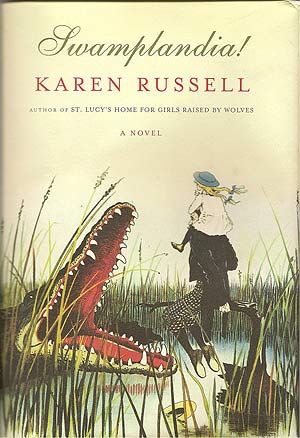
Swamplandia! by Karen Russell
Centered on grief and a family of fake-Indian alligator wrestlers, Karen Russell’s Swamplandia! is a sort of bouilla-book: The story feels alternately like a novel, young adult fiction, dark comedy and tragedy. Ava, the youngest Bigtree child, narrates her family’s emotional and financial unraveling after her mother’s untimely death from cancer.
Each surviving Bigtree copes in a different way: Chief Bigtree by dreaming up plans to save the Swamplandia! theme park without his wife to act as the headlining alligator wrestler; brother Kiwi gets a job at a hell-hole of a competing theme park where he jumps head-first into the mainland culture for the first time; and sister Ossie scours the obituaries for dead young men to date psychically. All this leaves Ava fairly helpless and alone in her family, a new experience for the strong young alligator wrestler.
It’s only Russell’s skilled writing that makes the novel’s pile of elements join together to tell a great story. The book is strewn with unexpected details and plot elements that arise from the swamp’s thick air. Ava’s scant 13 years and the authenticity of her honest, painful adolescence make parts of the book feel like a bizarre and beautiful Judy Blume novel, but the girl’s insight and phrasing is full-grown. — Shannon Finnell
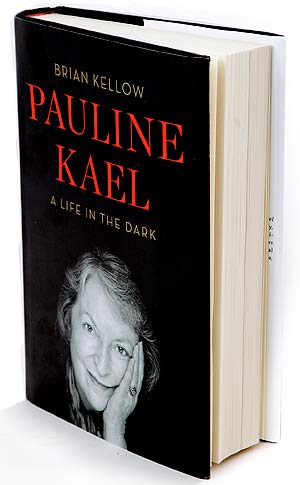
Pauline Kael: A Life In The Dark by Brian Kellow
Ten years after her death, Pauline Kael remains such a divisive figure in film criticism that the Los Angeles Review of Books ran two reviews of Brian Kellow’s new biography: One, by Richard Schickel, takes the slightly weary, I-was-there tone; the other, by Laurie Winer, begins, “When I discovered Pauline Kael circa 1977, I loved her immediately and deeply.”
To his credit and the strength of his book, Kellow takes neither side. He’s clearly an admirer of Kael, but his admiration is of the sort that obliges him to show the whole picture, even when it’s ugly. Pauline Kael: A Life in the Dark starts slowly but delivers a solid grounding in Kael’s early life, from her childhood in rural California to her time in the Bay Area, where she was a radio film critic and wrote program notes for Berkeley’s Cinema Guild. In 1948 in Santa Barbara, Kael gave birth to her daughter, Gina, whose complicated place in her mother’s life is a tale of its own.
In 1965, Kael’s first book came out. I Lost it at the Movies got excellent reviews and set Kael on a more visible path, leading to writing assignments at McCall’s, the Atlantic Monthly and, eventually, The New Yorker, where she wrote for almost 25 years. Kellow traces Kael’s history through her writing, which was always forceful, enthusiastic and sharp but grew “shriller, more insistent” over the years as she wrote in support of the movies she felt were in danger of being washed away by a blockbuster tide. Her prickliness is apparent, but so is her interest in taking certain young critics under her wing. And her successes are prominent, but Kellow also explores her failures, including her arguably most egregious misstep: the flawed 1971 piece on Citizen Kane, for which she appropriated UCLA professor Howard Suber’s research without a drop of credit.
An awareness of Kael’s position within the changing world of film criticism runs through the book, which is rich with both film history and perfectly chosen snippets from Kael’s reviews. Kellow’s honest, engrossing look at her life and work reveals a difficult, admirable character, a stubborn, passionate, idiosyncratic woman whose unmistakable voice, outsized personality and love for cinematic storytelling made her a vibrant — and divisive — figure for anyone who cares about film.
— Molly Templeton
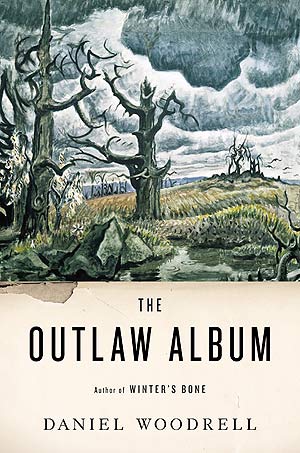
The Outlaw Album by Daniel Woodrell
Born and raised in the Missouri Ozarks, a high-school dropout, ex-Marine and graduate of the vaunted Iowa Writer’s Workshop, author Daniel Woodrell is quietly, steadily composing a body of work that ranks among the finest fiction writing of the past thirty years. His 2006 novel Winter’s Bone, a haunting, meth-addled domestic drama raised to the pitch of Greek tragedy, became one of last year’s best movies, and several of his books — including Tomato Red and The Death of Sweet Mister — have garnered awards and loads of critical praise. As a Southern writer mining the Ozarks’ claustrophobic, psychic terrain of poverty, pride and defeat, Woodrell is often compared to Faulkner, though in style and tone he is more in line with Flannery O’Connor, Raymond Chandler and Chris Offutt — a bewitching combination of hard-boiled and swamp gothic that Woodrell himself calls “country noir.” His writing is beautiful, his stories terrifying.
Woodrell’s first collection of short fiction, The Outlaw Album, is a stunner. Delving into the harsh realities of life in the Ozarks, his stories often read like peremptory obituaries for perpetual outcasts, and the topography of his mortal coil is defined by vengeance, retribution, alienation, loyalty and sudden violence. This new collection contains at least two genuine masterpieces of the form, “Black Step” and “Woe to Live On,” but there’s not a misstep in the bunch. Whether set during the Reconstruction or dealing with the implosive rage of Gulf War veterans returned home, each story deposits an eerie aftertaste of gunpowder and rye. Woodrell hits quick and hard. The first sentence of “Florianne,” a four-page story heavier than most novels, reads: “If they ever catch who took my daughter, I’ll probably know him,” and the last line, “How much of our world is in on this?” The question is rhetorical. — Rick Levin